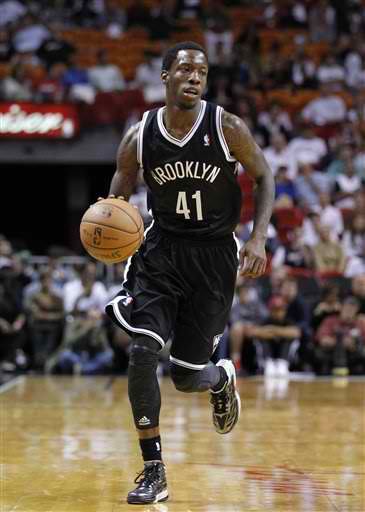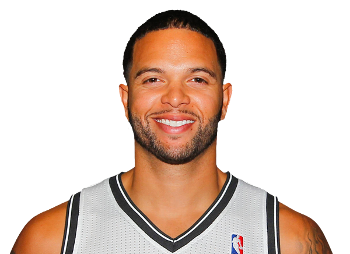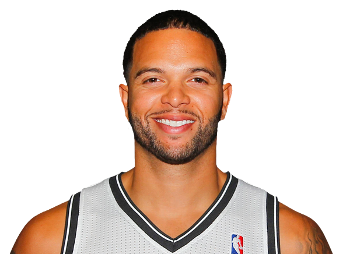Brook Lopez, as always, is the first Brooklyn Nets player to address the media. Unlike always, roughly 30-40 media members, complete with television cameras, microphones, cell phone recorders blanket him, in a seemingly endless swarm to hear his thoughts on the game, on Brooklyn’s first season, and what could have gone differently. Unlike always, Lopez hasn’t had any time to get changed, so all cameras focus on his chest and upwards: below the shirt, Lopez is wearing only a towel.
Lopez sighs before taking the first question. Despite the sea of media, Lopez is as consistent off the court as he is on it. He’s been a good soldier all season; he provides media members with the quotes they need and proper angles about playing hard, trusting teammates, providing “the boost,” and taking blame even when the blame isn’t necessary. He deflects praise. He says he should have done more when his teammates and coach did more than enough. He stares down at his feet, and straight ahead above the crowd of audio gobblers, but rarely directly at someone. He kindly and respectfully answers the same questions, with slightly different wording, from multiple media members. He is Brooklyn’s goofy public relations official, and in proper PR fashion, you’ll never get him to criticize anyone but himself.
Soon after Lopez finishes talking, the media amoeba huddles around Jerry Stackhouse, primarily because one camera swung in that direction. The hivemind goes where it smells a story, and Stackhouse can provide one; He is Brooklyn’s veteran leadership, 38 years old and a principle member of the National Basketball Player’s Association, Stackhouse may have something to say that other guys haven’t learned yet.
Stackhouse doesn’t provide star power, though. As he speaks, the media amoeba slowly dissipates. Two international media members break off to speak privately with Mirza Teletovic in a language I don’t recognize. Three or four beat writers wander to Keith Bogans, nearly dressed, presumably to ask him about not playing against his former team in six of seven games. More wander to Reggie Evans. Evans often holds R.J., his young son, in his arms while doing interviews as R.J. mindlessly plays with people’s recorders or a balloon or anything else within his grasp, but R.J. is nowhere to be found tonight.
C.J. Watson and Tornike Shengelia appear to have snuck out, though Tyshawn Taylor gets caught by one straggler. MarShon Brooks jokes towards Andray Blatche — “don’t act like you ever call me, Dray” — and I do not see him again.
Soon, Nets guard Joe Johnson, fresh off his worst game of the season, slinks through the remainder of the Stackhouse crowd to his own locker, which sits stage left of Stackhouse’s. The amoeba reassembles. Stackhouse fields two more questions, including mine about P.J. Carlesimo’s interim status (“I couldn’t give a damn about P.J.’s status right now,” Stackhouse says, kindly but firmly ending the interview) before the attention turns fully to Johnson.
By nature, Johnson — the highest-paid player on Brooklyn’s roster — is soft-spoken. He carries himself with an aura of cool kindness; never braggadocios, Johnson is always glad to speak with the media, even if he appears immediately uncomfortable by the beeping recorders. He’s not a slick talker or media magnet. Perhaps that’s because of his southern roots, perhaps it’s just a personal trait, but I often find myself straining to hear anything he says, even if it’s just “okay, guys, I’m ready for you.”
Free from the strains of being on the record, Stackhouse gathers his final personal effects, singing a hymn quietly to himself as Johnson prepares to speak. “I guess I should’ve sung the anthem,” Stackhouse says, cracking a smile. He walks over to Deron Williams’s locker to share a few private words. Williams, the team’s de facto leader and franchise player, will speak at the podium this evening for one of the few times this season, and the only time in a loss.
Despite my struggles to hear Johnson, he often says nothing of serious consequence. Johnson, like Lopez, knows to say all the right things about his teammates and none of the right things about himself. He is content with accepting blame, but also straightforward about the reality of the sport. He’s had nights worse than this, he promises us. Yes, it was difficult, Johnson says. Yes, it was tough not to come through. Sometimes it just happens.
As Johnson speaks, Gerald Wallace sits at the next locker over, staring silently into space. Losses consume Wallace, and his confidence was a victim of that consumption this season. No player on the roster ebbs and flows on the team’s success as much as their starting small forward. Lopez, Williams, and Johnson enunciate with the ferocity of a sea snail after near every game, but Wallace refuses to let monotony dictate his discourse.
Wallace curses the loss under his breath, before calling for “Timmy,” or trainer Tim Walsh. Wallace’s body has taken significant trauma this season, from his frequent trips of reckless abandon into the stands and the floor. He was a fan of recklessness since Day One, as Wallace injured his ankle in the first game in Brooklyn Nets history on a chasedown block, and it is the style that defines his game as much as his personality: brutal, straightforward, with nothing left unspoken. As he waits for Walsh, Wallace receives consoling from Matt Riccardi, the team’s Basketball Operations Coordinator, before Walsh comes to speak with him briefly and privately.
Like Wallace, Williams has spent most of his time silent at his locker, despondent. He speaks briefly to Keith Bogans, the player whose locker sits closest to Williams, and looks at Stackhouse with rapt attention as Stackhouse speaks. Whatever he’s hearing, he’s paying close attention to, or at least conveying focus. Veteran leadership matters in certain circumstances, and this is one of them, I think to myself. After a minute or two of quiet conversation, Williams nods and gives Stackhouse a slight smile, and Stackhouse exits. Williams dons the rest of his post-game outfit, complete with wide-framed glasses, and exits to the podium to speak once more with the media.
Williams handles his media duties with the same lukewarm vigor as usual. He’s fatigued from a seven-game series, from 41 minutes of playing time, from the weight of knowing what’s coming. Imagine speaking to 50 people in a crowded room about how you didn’t do your job well enough, then put it on national television. For all of Williams’s linguistic enthusiasm, he speaks quietly, robotically, almost broken. The season was fun, he says, and he wishes they weren’t so inconsistent. He loves his teammates, and wishes he wasn’t so inconsistent. He supports interim head coach P.J. Carlesimo (though the final decision isn’t his to make), and man, he wishes they weren’t so inconsistent. In a season that’s reached its final chapter, what’s left to say?
Williams finishes up his press conference and walks through the doors into the back hallway that leads back to Brooklyn’s locker room, heading to the exit for the final time this season. Taking his place on the podium is Joakim Noah, Chicago Bulls star center, who’d sat in the back of the room for the entirety of Williams’s press conference. He smiles, gives a high-five to a female Chicago Bulls official, and walks to the podium, the victor.

















